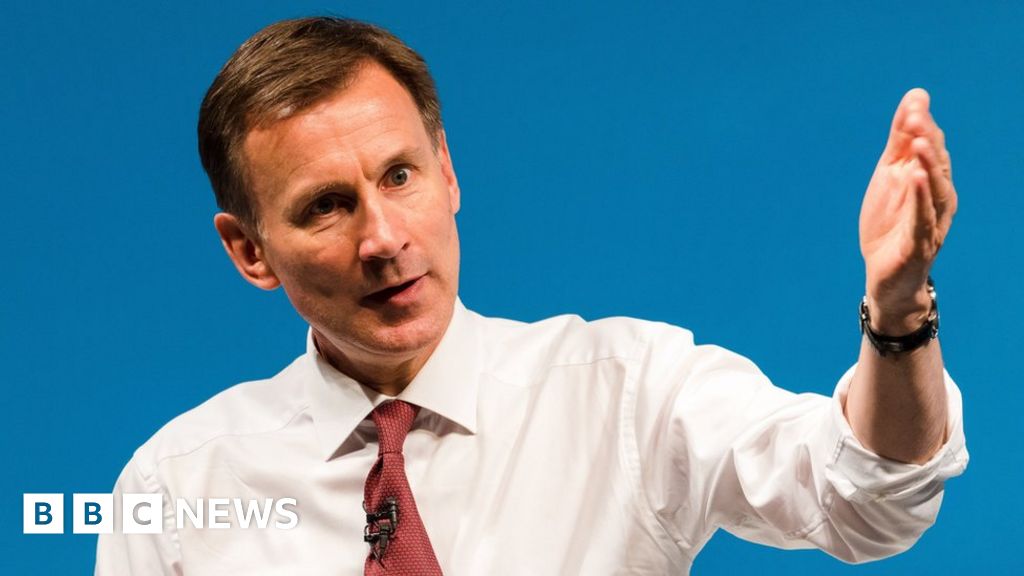
Foreign Secretary Jeremy Hunt is launching a fresh bid to stop the Iran nuclear deal unravelling and ease tensions in the Gulf.
Mr Hunt will meet EU foreign ministers in Brussels to raise concerns about Iran breaching some of its commitments.
The deal, which involves Iran limiting nuclear activities in return for the easing of economic sanctions, struggled after the US withdrew in 2018.
It comes amid heightened tensions after the UK seized an Iranian oil tanker.
On Saturday, Mr Hunt said the tanker, detained by Royal Marines earlier this month, could be released if the UK is guaranteed the oil it was carrying is not bound for Syria.
At a meeting of fellow foreign ministers on Monday, Mr Hunt will work with the European partners of the deal - France and Germany - to encourage Iran to stick to its pledges.
In a joint statement issued ahead of the meeting, Britain, France and Germany reiterated their support for the deal.
But said they were "deeply troubled" by recent events in the Gulf and "concerned" over US-Iran relations.
"We believe the time has come to act responsibly and seek a path to stop the escalation of tensions and resume dialogue," the statement said.
"The risks are such that it is necessary for all stakeholders to pause and consider the possible consequences of their actions."
Earlier this month Iran said it would be breaching the deal by breaking a limit set on uranium enrichment.
How will the US react?
Analysis by BBC diplomatic correspondent James Robbins
Britain, France and Germany are making a strongly worded intervention to try to prevent the crisis in relations with Iran deteriorating into something far worse: armed conflict.
The focus of their joint statement is on the need to try to preserve the 2015 nuclear deal which President Trump abandoned in favour of increasing sanctions against Iran.
It's a deal which Iran now says it is breaching because it is not delivering the promised economic benefits.
But Theresa May, Emanuel Macron and Angela Merkel say they are concerned by the risk that the nuclear agreement "further unravels" under the strain of US sanctions and Iran's decision to no longer implement key parts of the deal.
They go on to urge all countries "to pause and consider the possible consequences of their actions."
That's likely to infuriate the White House, seeming to equate aspects of United States hard-line policies with those of Iran.
What is the Iran nuclear deal?
In 2015, Iran signed up to a long-term deal - called the Joint Comprehensive Plan of Action - after the international community expressed concerns they were trying to develop nuclear weapons.
Iran, which insisted its nuclear programme was entirely peaceful, agreed to limit some nuclear activities and allow in international inspectors.
In return, the other signatories - UK, France, Germany, China and Russia - agreed to lift some of the crippling economic sanctions placed on Iran.
Speaking ahead of Monday's meeting, Mr Hunt said: "The Middle East is already one of the most unstable regions in the world, but if the different parties were armed with nuclear weapons it would represent an existential threat to mankind."
Why is the deal in trouble?
In 2018, Donald Trump said he would unilaterally withdraw the US from the agreement which was signed under the Barack Obama administration.
The other parties criticised Mr Trump's decision and said they remained committed to the deal.
On Sunday, the Mail on Sunday published a leaked memo which said Mr Trump abandoned the nuclear deal to spite Mr Obama.
Earlier this month, the International Atomic Energy Agency confirmed that Iran had breached the deal's cap on stockpiling of low-enriched uranium.
Iran said it was responding to sanctions reinstated by the US after Mr Trump abandoned the deal. Last week it confirmed it will break another of the limits imposed by the deal.
Deputy foreign minister Abbas Araqchi said Iran still wanted to salvage the deal but blamed European countries for failing to live up to their own commitments.
What about the tanker tensions?
Tensions between the UK and Iran flared up earlier this month when Royal Marines seized an Iranian tanker which was suspected of breaking EU sanctions.
The UK suspected Grace 1, detained on 4 July near Gibraltar, was carrying oil bound for Syria.
Iran denied it was headed for Syria and claimed the seizure of the ship was "piracy".
In a phone call with Iranian foreign minister Mohammad Javad Zarif on Saturday, Mr Hunt sought to reassure his counterpart that the detainment "was nothing to do with the oil being Iranian".
Mr Zarif also wanted to resolve the issue and was "not seeking to escalate" the situation, Mr Hunt said.
In response to the seizure, Iran threatened to seize a British oil tanker.
On 9 July, the UK raised the threat to British shipping in Iranian waters in the Gulf to "critical" - the highest level.
A day later, Iranian boats attempted to impede a British oil tanker in the region, before being warned off by a Royal Navy ship, according to the MoD.
Iran denied any attempted seizure, with Mr Zarif quoted as saying the UK made the claims "for creating tension".
https://www.bbc.com/news/uk-48984679
2019-07-15 05:08:49Z
52780330365006
Bagikan Berita Ini














0 Response to "Iran nuclear deal: Jeremy Hunt aims to ease tensions - BBC News"
Post a Comment